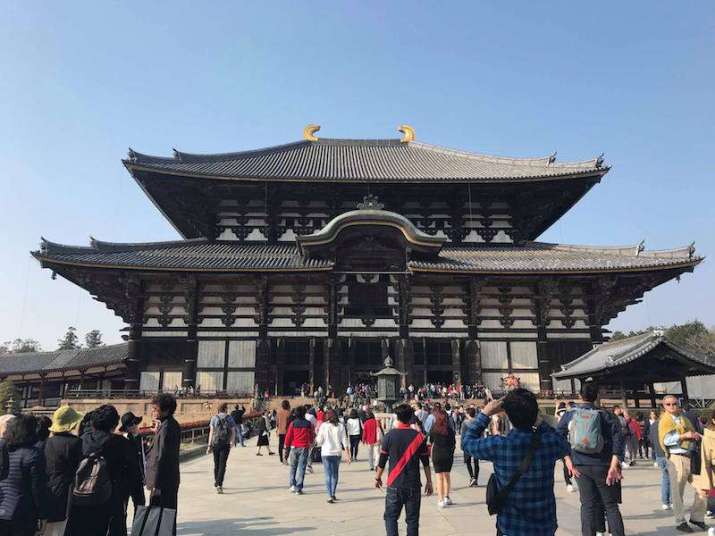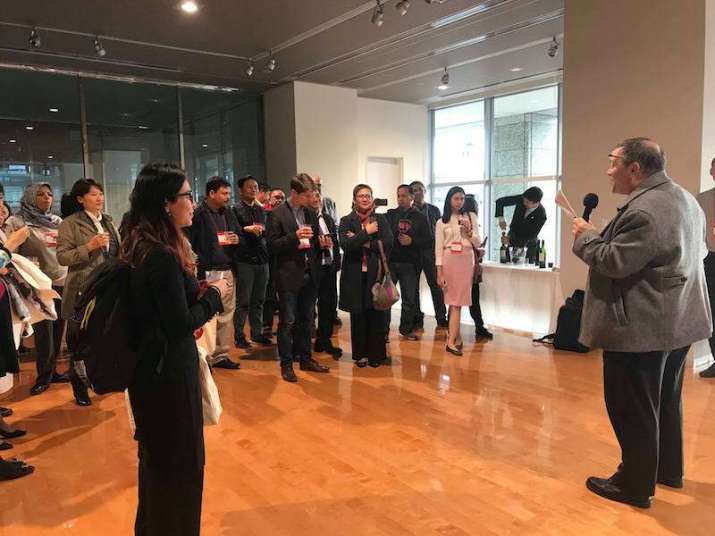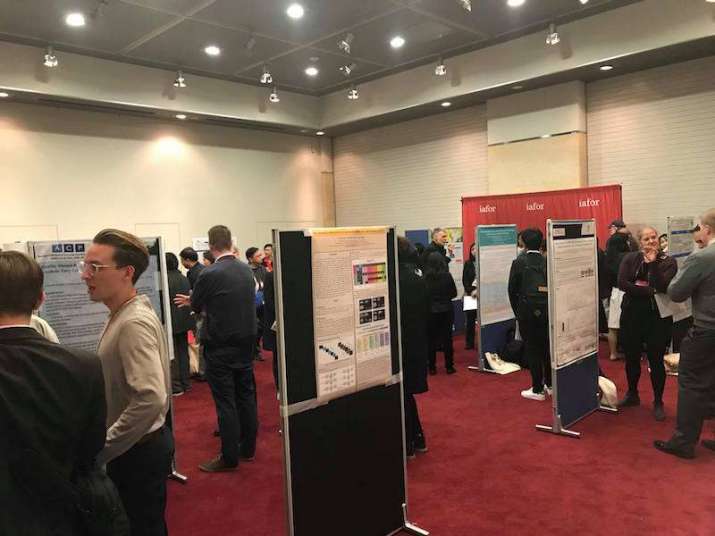FEATURES|THEMES|Exhibitions and Conferences
Surviving and Thriving in Times of Change: Buddhist Reflection and Action Amid Global Uncertainty
 Todai-ji Temple. Photo by BD Dipananda
Todai-ji Temple. Photo by BD DipanandaIn Buddhism it is said that nothing is permanent and that everything, including the fortunes of the religion itself, is in a constant state of flux. Buddhism has at different points in history been subject to incredible fortunes and disastrous calamities. In today’s uncertain global climate, it was fitting that the Asian Conference on Ethics, Religion & Philosophy 2018 (ACERP2018), held from 22–24 March at the Art Center Kobe in Kobe, Japan, had the theme of “Surviving & Thriving in Times of Change.”
The conference was held alongside The Asian Conference on Psychology & the Behavioral Sciences 2018 (ACP2017) and was organized by the International Academic Forum (IAFOR)* in association with the IAFOR Research Centre at Osaka University, and IAFOR’s Global University Partners. On 23 and 24 March, a local Japanese cultural organization called Group Wa organised a tea ceremony and conducted a workshop on Japanese calligraphy. As many scholars were present, the whole event was divided into several sessions simultaneously.
IAFOR framed the theme of the conference as a deliberation on the changes taking place during this unique period in human history. Change is assuming various forms in technological change, social change, and climate change. To address these changes in individual lives and for the global community, the organizer invited speakers to offer their thoughts through the traditions and lenses of studies associated with religion, philosophy, and ethical studies. The conference consisted of more than 100 presenters, including lectures and keynotes, poster presentations (some young scholars displayed posters showing their research and participants were invited to enquire about them), paper presentations, and virtual presentations (due to time restrictions, speakers who did not travel to the conference created videos of their presentations and uploaded them to the official IAFOR Vimeo channel, which will remain online indefinitely).
Frank S. Ravitch, professor of law, and Walter H. Stowers chair in law in religion at Michigan State University College of Law, delivered the keynote, titled “Law, Religion and Authoritarianism: From State Shinto to Religio–Trumpism.” His lecture addressed a unique form of authoritarianism that draws its authority from spiritual forces and is seen as a burgeoning threat to democratic institutions, human rights, and rule of law throughout the world.
 Photo by BD Dipananda
Photo by BD DipanandaIn his presentation, Ravitch focused on the relationship between religious legitimation and authoritarian appeals to selfhood, identity, and nationhood. Here he looked at two case studies: “the role and use of State Shinto in Meiji, Taisho, and early Showa periods in Japan and the use of religious culture and religio-patriotism by Trump and his followers in the USA today.” Several common features included the fusing of nationalist narratives with religious identity (America as a “Christian country” and Japan as a “Shinto nation”), focusing national anger against perceived foreign enemies, and the wish to liberate leaders from checks on their power.
There were also three featured panel presentations titled: “Psychological Literacy: The Most Important Literacy for the 21st Century,” “Shinto: Window on Universal Religion,” and “On Being Tolerant and Acceptant to Survive Life Changes.” Prof. Brian Victoria, senior research fellow at the Oxford Centre for Buddhist Studies (also a fully ordained Buddhist priest in the Soto Zen school), delivered the second featured presentation. The presentation covered a wide range of Japan’s religious history, including Buddhism and Shinto. He claimed that like Buddhism and other great religions such as Islam and Hinduism, Shinto can in some ways be defined as a “universal religion” with a worldview or reality that is applicable to all people at all times. He explored not only Shinto’s ritual and mythological content but also the impact of Shinto, its relations to animism as a global force, once prevalent in many cultures, and the evolution of Buddhist ritual following Buddhism’s encounter with Shinto in Japan.
The panels of the conference were titled:
- Qualitative/Quantitative Research in any other area of Psychology
- Psychology and Education,
- Philosophy and Religion,
- Mental Health,
- Religion and Peace Studies,
- Philosophy and Technology,
- Community Development,
- Mysticism, Faith, and Scientific Culture,
- Philosophy,
- Religion & Law,
- Linguistics, Language & Psychology/Behavioral Science,
- Ethics,
- Industrial Organization and Organization Theory,
- Philosophy and the Arts,
- Feminism and Religious Traditions, and
- Interdisciplinary Perspectives on Linguistics and Language.
The conference ended with a presentation titled “On Being Tolerant and Acceptant to Survive Life Changes,” by Dr. Monty P. Satiadarma, clinical psychologist and professor in psychology at Tarumanagara University in Indonesia.
 Photo by BD Dipananda
Photo by BD DipanandaI presented a paper titled “A Study of Process Consciousness and Process-free Consciousness in the Cognitive Process of Buddhist Psychology” in the panel titled “Philosophy and Religion.” I explored the Buddhist psychological experience as expounded by two streams of consciousness: process-consciousness and process-free consciousness. Process consciousness refers to the active condition of consciousness when it occurs in a cognitive process. Process-free consciousness refers to the passive condition of the mind when it is free from cognitive processes.
Process-free consciousness was presented by showing the three different functions: as life-continuum consciousness bhavanga-citta; death consciousness (cuti-citta); and re-linking consciousness (patisandhi-citta). My PhD research at HKU mainly focuses on process-free consciousness by addressing several questions, such as life-continuum consciousness, which is a less discussed subject in the suttas of the Pali Canon, and how it is connected to the Abhidhamma vision of the cognitive process during the mind’s active condition. I also reviewed Buddhist scholars such as Wijerekera and Rhys Davids’s views, which assert that the life-continuum consciousness is similar to the unconscious theory in Freudian psychology. As I am still researching this concept, I did not offer a conclusive answer but am expecting to discuss further my findings through the research I am conducting at HKU, which I expect to complete in three years’ time.
The world has rarely been more unstable and unpredictable. While we as individuals can only ever offer a small drop of a contribution in a deep, vast ocean of turbulence and uncertainty, we must accept that impermanence is the true characteristic of this world, and that the calling of the Buddhist is to help people attain wisdom from the experience of impermanence. Changes in society, economy, and geopolitical contexts provide, in one sense, excellent training grounds for meditations on impermanence.
* Founded in 2009 in Nagoya, Japan, IAFOR is a research organization based at Osaka University’s Osaka School of International Public Policy. This year, IAFOR is also launching another major research initiative that analyzes the Silk Road trade routes as lens through which researchers can study some of the world’s largest historical and contemporary geopolitical trends, shifts, and exchanges between countries and regions including Europe and Asia and maritime routes.
See more
The Asian Conference on Ethics, Religion & Philosophy 2018 (The International Academic Forum)
The Asian Conference on Psychology & the Behavioral Sciences 2018 (The International Academic Forum)
The IAFOR Silk Road Initiative (Silk Road)














